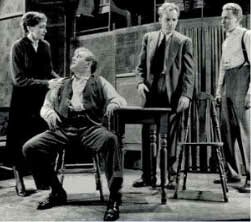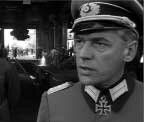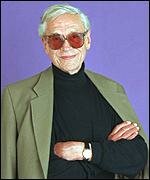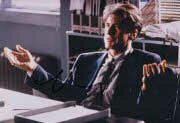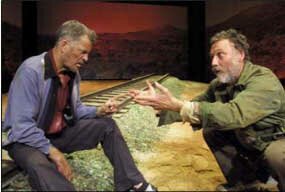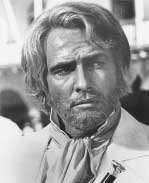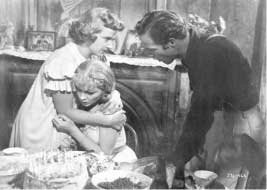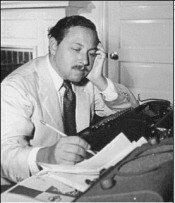
CYRANO'S JOURNAL®
THEATER / Kulturkampf | 24-Oct-07, 08:30 AMA dialogue on theater and contemporary artsBy John Steppling and Guy Zimmerman | Summer 2005(Part One) |
http://www.cjonline.org
ALL RIGHTS RESERVED, 2005 CJONLINE.ORG & SPECIFIC AUTHORS. PLEASE SEE OUR COPYRIGHT NOTICE.
If I look at a group of young writers from twenty years ago, say, a group I had some acquaintance with.....I see almost none who are doing the kind of work they should be. Now, it's presumptuous of me to say this perhaps --- and if I think of really talented writers like Kelly Stuart and Michael Sargent, I have to admit I feel something of this huge talent has been squandered. In what sense? I would simply say the system has used them, as it does everyone, and this process of getting produced requires a kind of tacit compromise --- but more importantly they have failed to question this process and system enough. They are surrounded by producers and directors and designers and actors who, often, question very little. They eventually sort of sink beneath the oncoming waters of normalization and the uber-values (even if they think they are criticizing it. The criticism tends toward the ironic and obvious --- toward a revealing of social hypocrisy, etc ...and not a real search for the bedrock pathology that produces such hypocrisy). The assumptions, again, of the ruling class. I could site a great many others, all of whom have talent....but none of whom seem to be exploring the form or questioning the society they live in, except in the most superficial respect. The two writers I mention, I hope, know how much I admire their talent -- but I see this everywhere, and it makes me wonder at the very possibility of creating serious work. You can see this happen in film too. Young directors make an interesting first film, and then the studios buy their souls and soon they are producing CGI infected cartoons. It is very hard to stay outside this process....it costs one on a personal level, and that cost is made all the more acute by how little is granted even those who stay obedient. Which brings us back to what "art" means to this society. It seems, at least partly, about control. Much like education. Create cultural product that will serve to stabilize the consumer mind and to dull the doubts and fears of the coming apocalypse.
Well, I hand this over to you now. JS
GUY ZIMMERMAN (GZ)
John: What you describe at the close of your comments has to do with the distinction between art and entertainment. Art exists to wake people up; entertainment to put people to sleep. People like Gordon Davidson quite obviously exist precisely in order to prevent real theater from coming into existence. Masters at the art of cultivating the placebo, such guardians of the stage protect contemporary bourgeois consciousness from accidentally encountering its own reflection while in pursuit of complete narcosis. Davidson’s favorite tactic is the identity issue play, civil rights being a kind of catnip to those on the left who no longer have the vitality necessary to ponder more basic issues. The fascists know this too, of course. Thank you Condi Rice and Albert Gonzales.
To me, Adorno, the Frankfurters, all the thinkers attempting to bridge the gap between Marx and Freud remain partial in their critique of bourgeoisie consciousness. By this I mean they themselves subscribe to some of the fundamental assumptions about human beings that under gird the system they then attempt to distance themselves from. It’s not hypocrisy, it’s just a lack of rigor or depth and a tendency to fall in love with the analytical power of discursive thought. Theory is as intoxicating as money, perhaps. But I don’t disagree with you per se, because you’re primarily an artist and your work is richer for the fact that you are reading Adorno and the theory percolates up in all sorts of ways that resonate artistically. mmmmmmm
mmmmmm The work we do continues to be animated by residual energy from the Off-off Broadway, which itself connects to the great leftward drift of Western culture from the 30s through the 70s. We’re now at the far side of an opposite sweep to the right, and we can all hear the rivets popping and we can all sense massive atrocities crowding the horizon. I think about the apocalyptic undertones of European art produced before and during the First World War, a sense of fatalism, a dull expectant stupor. I recently read a fascinating essay on Duchamp by a woman named Tosi Lee who identifies a spine of, I kid you not, Buddhist iconography running through all of his work. Apparently his neighbor for five years as a young man was a monk and there's evidence Duchamp was a practicing meditator. Dada, it turns out, comes from Abhayamdada, which in Sanskrit means "Giver of Fearlessness," an avatar of Avalokiteshvara. The other Dadaists were probably unaware of what lay behind the coining of that phrase. So deft, Marcel. This is resonant to me on many levels because I was fascinated so early on by Duchamp...but lately I've been struck by what it must have been like to make art in the epoch following the First World War, when the destructive idiocy of human beings was so monumentally obvious as to be somehow unmentionable...and how the futility of the artistic protest drives everything toward a grammar of cryptic gestures...dreaming out loud...
The basic point, though, is that theater is a mode of thought and as such inherently corrosive to power, and this is why tyrants always close theaters first, in this country by various hidden subversive acts. To me, theater is uniquely positioned to examine issues of Self and Other, which is why thinkers like Lacan and Levinas are so remarkably fruitful while writing theater. I lob this up there…
GZ
Guy: Well, I would certainly second those comments about Davidson. The major flagship theatre in Los Angeles, and one of the largest in the country, was run by a man, who, for decades, was devoted to destroying young talent. A remarkably stupid man as well, but that’s perhaps too obvious.
Also, he understood the dialectical aspects of technique and craft, and he understood, like Benjamin, that serious art is both a negation (one that demands a subversion of expected forms and conventions) and something more, something about, I suspect, what you refer to as 'thinking'. The thrust of his late thinking, if I read him correctly, was to examine the illusions of freedom, the way the repressive forces of domination have come to eclipse our desires to the degree that we have no real desires. He abhorred notions of cheap moralizing, and saw (like Broch) that art was a moral force, but not by being ideological, but by being in opposition. Now this has interesting implications, because Adorno thought artists almost had to be as fucked up as the society they are in reaction to. I think we raise questions here better answered by R.D. Laing and Wilhelm Reich, in terms of what is health. The artist almost has to find a strength of character to survive as an artist, which does not mean he will not go insane (was it Artaud that said 'madness or slavery'?). To resist today, as an artist, is to almost accept one's own isolation and estrangement. One must both engage, and stay apart --- and in this ever more mediated culture, this is increasingly difficult. By the way, Adorno saw Beckett as the greatest writer of the century.
Alright, now I am wondering about the various elements of theatre. When I teach in Lodz (at the film school) I find myself inclined toward, almost always, a mythic or ritualistic analysis of student work. To look at scripts as if they were fairy tales. I fear this is partly because of the a-historical and unpolitical nature of this generation. They simply seem unable to recognize the difference between trivia and seriousness, between the facile and narcissistic, and that which has political and historical dimension. They are dependent on pop-psychology to "explain" narrative. When I suggest all stories have already been told, and that the point is how you tell it, they react with confusion. (Curtis White wrote a great critique of Saving Pvt Ryan....and he mentions this, asks how it is people don’t see how fascistic this film is? The answer is because they cant 'read' it).Anyway, this lack of critical awareness is the result of decades of increased marketing and advertising, and how even news and sports are marketed (and are entertainment). All sleep all the time. So, when you mention dreaming, I think we have touched on something. mamama
However, let me mention a couple other things, first. I think theatre is about the 'off stage' (I've said this before). I think the off stage is the unconscious, and the stage the conscious mind. This is reductive, of course. The essential point is that what is really going on (as Murray used to say) is going on off stage. The Greeks knew this, and Shakespeare didn't. Shakespeare knew just about everything else, though. The audience must journey to that unknown realm if it is to discover anything. Now, this journey can be short circuited....as in the play you described above, and the mandarins of institutional theatre are committed to stopping such spiritual travel. Artaud asked for nakedness, for a kind of insanity and a destruction of convention. We all responded to this; everyone writing for theatre today, if he or she is any good at all, has internalized Artaud. Institutions cannot allow this subversive questioning, for that is all it is, and so they reward the facile and superficial --- which is ALWAYS reactionary. Capitalism demands a certain alienation take place. Today we see a people, in the west and especially in America, totally alienated from nature and increasingly from themselves. It's mass psychosis. It is also a refusal to journey. The mysteries of the off-stage, the mysteries of the universe that surrounds us (think of that early scene in Woyzeck) are now cleaned up and defined by mechanistic science, and trotted out as progress and advancement. The Enlightenment was a double edged sword, to be sure. There is nothing wrong with science and with dispelling the dogma of the Church, but this very corrective movement toward the rational has now been swept away in the Capitalistic dogma of profit -- profit for the few. This is the age of control, as Althussar liked to remind us. Foucault wrote of the age of discipline, which has now morphed into the age of control. Well, the cultural wardens of this asylum will always choose to prevent that which might disrupt control. So when you ask what is to be done, I think the first thing is to reject these institutions. When I wanted big equity productions in LA and NY, deep down I knew, first, I wasn't going to get them, and second, even if I did, I would be destroyed. The play I wrote would be destroyed as well. mamamamm
And the exceptions only prove the rule. The system must be justified. Things can be wrong, but they will be reformed. The real existential nightmare of waste and death that goes on daily in most parts of the world is to be ignored.....unless, yes, it is treated as an anomaly --- that which will be corrected. To suggest it wont be corrected or reformed is to be found unsuitable for the theatre. It goes deeper than this though, it touches on the nature of the language used. This is complicated, but the alchemy of words, or words on stage, is so amazing and so pregnant with revelation that I suspect this is the real driving fear of those in control. The wonder one feels walking in the woods is, today, to be controlled and neutralized. All is surveillance, and all is about being obedient. There is an illusion of freedom and choice, but really, the walking path through the woods is clearly marked. To venture off the path will result in citations and fines. This is for your own good, of course. The wonder of nature is reduced to postcard pabulum, to simple one dimensional "beauty". As Adorno said, only a philistine would use an expression like "a feast for the eyes". Real beauty is terrible and dark and mysterious --- it is the sublime (for lack of another word).
There is so much to talk about here. I want to touch on acting, as well. On performance. What are actors doing, exactly, when they are on stage --- and perhaps more importantly, what is the audience doing? However, I will leave that until next time.
Yours, JS
John, In my view, if you dig beneath Freud and Marx and you will find the central currents of Buddhist thought. In Freud, the Buddhist view of the selfing mechanism is quite clear (see Mark Epstein’s “Thoughts Without a Thinker,” for example); in Lacan even more so. That we are deluded when we take ourselves to be essentially solid and permanent entities, separate from all others, continuous in time and clearly defined – this is implied in Freud’s basic project. Marxism, in turn, intersects with dharma in the way that, for example, it places reification at the root of “false consciousness.” Buddhism (in its rigorous forms at any rate) is fundamentally an account of how the reification mechanism generates the delusion of selfhood, which is viewed as the ultimate source of all human suffering. So here, on the ground below Marx and Freud, we find the most cogent and powerful total critique that has to date been formulated, complete with hundreds of highly effective practices for counteracting its effects. Beauty, it seems to me, is simply the perception of things as they are with all of the veils removed. You’re completely correct about beauty being terrible and dark and mysterious. Like Rilke’s angels, real beauty threatens to destroy us, is deeply wounding. We are here for a short time, death surrounds us, our emotional needs will never be met – these difficult truths have to be confronted if we are to experience anything real.
On a formal level, theater is all about the mechanism of reification quite obviously. Tragedy in particular runs the mechanism in reverse, so to speak, subjecting a personality to enormous stress in order to force a collapse. But even more so, the basic set up of theater invokes forces that lie at the heart of the process by which we become ourselves. In the Tibetan account, for example, the self is viewed as a delusion that arises in reaction to the “unresponsive Other.” The Other is first perceived as something separate, a consciousness that, by virtue of its separateness, poses a mortal threat. The self in this view is artificial, fundamentally insecure. Whether this Other is intensely desired or intensely hated and feared, the separation is what places, as it were, a question mark over identity, creating the first of an endless series of unresolvable crises. All activity becomes bent by the need to legitimize and give substance to an impossible fiction. The Hobbesian war of all against all commences in the grip of this bewilderment, which also conceals an equally powerful longing to re-unite with the Other. The initial trauma that sets the process in motion is inevitable. It happens early in infancy when, for whatever reason, the maternal presence is no longer close at hand. The web of consciousness experiences a sharp blow, and this first note entails the whole sonata. What fuels this demonic process is simply the action of patterning, what those who study chaotic systems call “sensitivity to initial conditions” - the bank of mud now has a first furrow and subsequent experience tends to flow into that furrow, deepening and expanding it. This pattern of thought and emotion develops a facsimile of will, which is at root simply the general tendency of patterns to perpetuate themselves. Counter posed to this “false self,” in the Tibetan view, are the various manifestations of “pristine awareness” which is simply an unconditioned, direct experiencing of the world (sensations, feelings, and thoughts).
To talk about this process using the metaphors of patterning, etc., is to make it seem dry and impersonal, whereas in fact nothing could be more personal or electric (for good and bad) in an emotional sense. And this is only a thumbnail sketch, of course, but the connections to the theater work we do is clear. The stage is all about the “unresponsive other.” This is hard-wired into the basic set up, clearly. The audience is passive, right there, breathing the same air, but also, by definition, unreachable. The basic poignancy of theater, of a character on stage, comes from this fundamental fact, and I think what unties the Padua playwrights and what certainly animates your work, is a respect for the power of this basic fact. Lights up. The character looks out. Blinks. We are already at the heart of the mystery.
Anyway, this is all to say that theater is basically a way to address the haunting issues of Self and Other that lie at the root of consciousness, and of how we live collectively and alone. I would say that at this point one can hear the waters of Buddhist thought lapping in the basement of western culture, in science as well as in the arts. This is happening because the Buddhist account, despite the way it can be distorted by peddlers of new age dogma, remains the most cogent and austere and accurate depiction of the human catastrophe. It’s not a religious thing at all as it has nothing to do with belief. At root, it’s empirical and pragmatic – we are not what we think we are. To circle back to where we began, art is about pointing this out to us; entertainment is about telling us to ignore the whole thing.
As for what’s happening in America today, I agree completely with all your comments. Standing outside of history is a good way to put it. People are being hollowed out, changed perhaps into something different, a generic absence in the grip of a dream. The lack of differentiation creates that crises Girard describes, where malaise is general, anxiety endemic. Such periods tend to be followed quickly by catastrophic violence – War. The end of the 19th century is an obvious parallel.
In any case, I now heave the medicine ball back to you…
GZ
Guy: Alright, well, I think you raise a very fascinating question here about audiences. I might, just to play devil's advocate for a moment, argue that the audience is not so much an unresponsive other, as it is one side of a process of transference (and I suspect I am possibly not really responding to what you mean, which might not be the audience at all). There is the analyst and the analysand --- and there is transference and counter-transference. Now, what is important is that audiences are there, in theatre, to listen. This listening is a profound aspect of our consciousness. The failure to listen is part of today's decadence. The additional factor in all this is connected to the role of actors and of the playwright. The writer is not present, but hovers like a kind of phantom. The actors --- well, this is where I think we need to sit back and think for a moment.
What are actors doing? They are not trying to fool us that we are watching real life (sic)....we in the audience know we are watching a performance of a thing called a play. So, what are they then doing? They are performing. Which means what? This is terribly complicated, I think. Depending on the play, actors are performing roles, performing characters written by the playwright. Again, however, I find this an unsatisfactory answer. It raises a question I keep asking, what do we mean by character? Have things changed since Shakespeare? Since Brecht? Since Pinter? Are we comparing apples and oranges? What gets put on stage is a reflection of ourselves, in some sense. It is a civic and social process. In Greek tragedy the notion of the citizen was only just being formed. Questions of responsibility and duty were huge --- and the role of the gods and demi-gods, and all this in a "democracy" based on a slave economy. Since the development of nations was cotemporaneous with the rise of Capitalism, Marx is probably right that the whole idea of a state is a justification for protecting the rights and property of the ruling class landowners. The invention of armies and police is purely for this reason. I trust no rational sentient human thinks cops are there for 'our' protection. This is why TV cop drama is so odious, why Bochco and such people are such crypto-fascists. So, this tension, this dynamic, between the classes cannot be ignored, I don't think. We see how certain notions of class even affect the western appropriation of eastern disciplines...including Buddhism. Now, having said all this, my point (I hope) is to bring this back around to how we create a reflection of ourselves on stage.....or to ask if that is what we are doing? For the citizen of today's America, I would wonder at how their sense of self, their experience of themselves is identified in cultural product? In theatre? Today's average ( a dangerous word) citizen is so in denial, so bloated with anti-depressants and junk food, so addicted to gadgets and consumption that I wonder if there is much of a self there. Perhaps art has never really been for mass consumption, though. This is tricky, because I come from the under-class, a place where few of us were deemed worthy of education let alone the pleasures of high art, so I don't want to suggest a kind of elitism. Still, artists are reacting to specific conditions --- and are part of those conditions. They have internalized those conditions. The kind of play we are decrying is, I suspect, a play where the truth of this historical moment, the truth of the madness around us, is ignored. There are token exceptions....a Sarah Kane for example....but they only prove the rule, again. So we are seeing plays where "characters" are nothing like people, they contain no dimensions of history and no genuine language to resist the insanity of Imperialism and endless war. They are creations based on "types" and are utterly predictable and utterly banal. They have histories, but exist outside of History. The collapse of public education certainly plays in here too, for increasingly illiterate audiences mean increasingly illiterate plays. mmmmmmm
This is significant. I suspect the future, part of a resistance to this irrational system, will be to find ways to refuse such dependency and focus on product. The process --- in this age of mechanical reproduction (per Benjamin) must become the governing principle. Process and not product. Artists who accept the compromises of the system are doomed to triviality --- albeit many of them will take that exchange knowing a new BMW comes with it. Well, if you think, in your heart of hearts, that a new Beemer will make you happy, then good luck.
I think this question of the political, however, as you raise it, is a bit too pat. Luther and Calvin can be analyzed (and Marcuse did this in an early work) in terms of authority. The history of the church in the west should be seen in the light of domination and control. Here we return to the audience again, perhaps. And to dharma. Its true that such ground exists beneath Freud, and Jung, too, for that matter, though I am less sure of Marx. We can trace much of this back to the pre-Socratics if we choose to, then what happened with Plato --- the categories and systematizing. The side route led to mystics like Meister Ekhart and Theresa of Avila, or Duns Scotus and Peter Abelard. The medieval church writers were quite a distance from the fatuous reactionary half baked crap of the Vatican today, or the fundamentalists in the US. There is an unfortunate neglect of them, actually. Anyway, the audience for theatre, as opposed to film, has to exist in some form of community, and community is something that is under siege in the era of neo-liberal globalization. The destruction of traditional community ties is a more profound reality than most people realize. There is a great article by Eisenstein, written in 49 I think, on socialism --- and the irrationality of Capitalism. An article not mentioned much these days, needless to say. He speaks of this loss of tradition -- and I think we see now the loss of audience as being connected to this. People are more and more atomized, more and more isolated and in touch with only their cell phones and computers. They live in total anxiety and invented fears. Nature is dangerous (those 'killer' storms) and certainly those terrible terrorists hiding in caves --- you know, over there, in one of those backward dusty places. "Dark corners of the globe" as Bush put it once. So how is this connected to your description of the self and other? I think its what people like Callaso, and Girard, Ricouer and even William Burroughs and Gary Snyder are, or were, trying to bridge. How are those basic ontological mechanisms mediated by material history? Because they are, I am pretty certain. The objectification of the "other" now goes beyond the Lacanian, and is politically motivated by the forces of Empire. The occupation of Iraq is a good example of a collective extension of the 'self and other' mechanism of suffering.
One final thought for now, and that is about Shakespeare and Bloom's notion of his invention of the human. I wonder, say, about Dante. His characters certainly don't reflect on themselves in the way Shakespeare's do. Did Dante himself reflect this way? I suspect not. This to me is very interesting. Dante, who was influenced by both the Church, Aristotle, and to some degree by the Arab philosophers like Avacenna, existed in a time where the idea of the individual was much different. After Shakespeare we see the steady growth of this subjectivity until we reach Dostoyevsky. In Crime and Punishment we see how many pages devoted to the inner thoughts of a man opening a door. Then comes modernism and the corruption of this subjectivity --- and I don't really know if I believe what I am saying here..--- but lets see where it goes. So today, the endless crap turned out by writing programs and listed on the NY times bestseller lists and on Oprah is just endless navel gazing. Its all about "me" --- and about absolutely nothing else. It is a deeply flawed reading of that original Romantic impulse. In Beckett we have reached the end of modernism, and in a different sense with Kafka. Something changed with Kafka, I suspect. I don’t' know what, but one sees it in a Bernhard for example. There is something gestating right under the surface --- and its hard to know what it is. A new human something.
On that note of utter obscurity, I toss this horseshoe over to you.... JS
John: Well, Kafka is extraordinary in all respects. I’m not sure who it was, Gershom Sholem perhaps, who viewed Metamorphosis as an allegory of (kabalistic) enlightenment. This is terrible and also very amusing. To become enlightened is to become freakishly different from normal predatory consciousness. To me, this rings true about the story. In general I find that Kafka becomes less strange and uncanny as time passes in that the world is catching up to him. I suspect he’s still decades away from revealing his full relevance. Interesting to view Kakfa from the perspective of Girard - Kafka writes from the perspective of a scapegoat strapped to the altar, it occurs to me. The world seems so hallucinatory and strange because of this unique perspective, which imparts a terrible clarity. mmmmmm
Film programs cropped up when the studios began to cut back production under the assault of television. The programs produced one generation of good filmmakers (Scorcese, Coppola) and then it all turned to shit. Now people have forgotten how to tell original stories – the popular imagination is entirely a re-made from the 1970s. Art can not retain its relevance as just another career choice, complete with institutions of accreditation, professional licensing bodies, etc. Art is a vocation, and there’s a world of difference between a career choice and a vocation. The proper training for a vocation comes through master/apprentice relationships, not some institution in which artists are subtly undermined and infantilized. These small concessions to bad faith (and obviously the whole grant application boondoggle would be included here) end up poisoning the whole enterprise of art at its roots.
The subject of how the forces of self/other projection manifest historically and are mediated by material history is the heart of the matter. You’re completely right about Iraq. The Neo-Cons are utterly conscious of what they are doing. Leo Strauss, as I understand him, explicitly calls for the creation of foreign enemies in order to instill the proper love of country. This is astonishing: hatred is good for us, because it gives us a clear sense that we are something. How utterly bizarre. And yet of course it’s effective in that it’s always much easier to reach down the evolutionary ladder than to reach up it. Malcolm Gladwell wrote a piece in the New Yorker about the way corporate marketing people have learned to by-pass the cerebral cortex and appeal directly to the “reptilian” brain. The curving interiors in your luxury SUV’s, it turns out, appeal to our primitive longing for the comforts of the womb. The Republicans have simply taken this strategy and applied it to the political arena. The result is the nightmare we’re currently stumbling through. Not everyone has a brain, but everyone has a brain stem, I suppose would sum it up. However, I think the Right has been successful mostly because they’ve been able to delay the negative effects of their ridiculous policies. This doubling down of aggressive, destructive behavior is the hallmark of fascism. Disregard for the long haul confers tactical advantages in the short term. Sooner or later, though, people catch on. It’s like Winston Churchill said about Americans, that you can “count on them to do the right thing, but only after exhausting all other possibilities.”
What would it mean to reach “up” the evolutionary ladder? For me, there has to be a way to grapple with the root cause of human depredations large and small. Obviously, I’m a proponent of the Buddhist view of such things, though I don’t really consider myself a “Buddhist” (what would that mean, anyway?) What appeals to me is how comprehensive the critique is, and also the pragmatic aspect – the root of the problem can be addressed in the here and now. They speak of three turnings of the “wheel of dharma” which include the original sutras, the Mahayana tantras and the Vajrayana or Tibetan practices (Dzogchen). The encounter of Buddhism and the west is perhaps the 4th turning, and of particular interest currently are the Mind/Life series of dialogues between Western neurologists and the Dalai Lama’s people, where the scientists are grappling with this long tradition of mind training that has measurable effects on brain morphology. There’s a lot of work being done in the lee of Francisco Varela’s The Embodied Mind. Another interesting book is The Taboo of Subjectivity by Alan Wallace which examines in detail how the Self-Other dualism taints the scientific project from the get-go. Stephen Batchelor also is very eloquent about the Romantic rebellion (which we are still a part of) against this fundamental error. Now, advanced Buddhist practitioners are capable of Philistinism when it comes to the arts, but my point is that if a “paradigm shift” happens in the temple of science one begins to see some hope for a more general pacification of the demon of materialism.
However…
The thinker who haunts the edges of any long view of western history to me is Rene Girard. No one familiar with Christian eschatology can be anything but disturbed by how the current geo-political clusterfuck centers around the landscape of the Old Testament. It’s uncanny the same way the Pentateuch is uncanny. And Girard, of course, tackles this directly, removing the mystery of why this should be so, while leaving the uncanny-ness intact. People write him off because it’s all too disturbing, but I believe Girard’s basic ideas about mimesis, reciprocal violence, the sacrificial crises and the scapegoat mechanism contain the key to reconciling dharma with Western history. What fuels the cycle of violence, it turns out, is what the Buddhists mean when they talk about “emptiness.” We must aggressively imitate each other in our hunger for “Form” because we fundamentally lack form. Mimesis represents a basic aggression intrinsic to the making of selves. On the social level, this basic aggression underlies the initial murder… that ignites the blood feud…that leads to clan-on-clan warfare…that wipes out the tribe. The scapegoat mechanism salvaged the situation in the short run, in that only cultures that were able to develop sacrificial rituals survived. But the fundamental violence still percolates underneath. I read recently about a study that found much common ground between the psychological characteristics of CEOs and serial killers. This should not be surprising, given that Capitalism is a system fueled by greed and aggression. In America the twin evils of slavery and the extermination of the indigenous population, for example, remain sources of dark energy (as well as twin debts that will have to be repaid.). Satan under girds our world.
Girard’s thesis is elaborate and slippery, but also in a sense quite simple. The dynamic of violence will run its course, leading to a final crises. Girard is especially clear on the role that Judaism and Christianity have played in this dynamic. Both religions are, mythically speaking, entirely about the scapegoat mechanism and the violent impulses it contains and re-directs, according to Girard. And here we turn again to the relevance of theater and tragedy, which also has its origins in sacrificial ritual and the scapegoat. Why people would rather experience the Apocalypse then support tragic drama, is of course an open question. I will now lob this conundrum back across the net -
GZ ABOUT JOHN STEPPLINGPlaywright, director, screenwriter and teacher, Steppling was an original founding member of the Padua Hills Playwrights Festival and has had his plays produced in London, LA, New York, Paris, San Francisco, and Poland. Plays include The Shaper, Teenage Wedding, Neck, Dog Mouth, The Thrill, Wheel of Fortune and My Crummy Job. A collection of his work was published by Sun and Moon Press in 1999 (Sea of Cortez and Other Plays). He is a Rockefeller Fellow, multiple NEA recipient, and PEN-West winner. His last film credit was Animal Factory (directed by Steve Buscemi 2000). He now lives in Krakow, Poland with his wife Anna Kuros, and teaches at the National Film School in Lodz.ABOUT GUY ZIMMERMANGuy Zimmerman is the Artistic Director of Padua Playwrights. Since 2001, he has staged award-winning productions of new plays by numerous contemporary playwrights (including DogMouth, written and directed by John Steppling) in Los Angeles and New York. He also serves as Supervising Editor of Padua Press, publishing anthologies of new work that are distributed nationally through TCG. Among his teachers are Ken McCleod Katha Pollit and Mark Crispin Miller. His plays include La Clarita, Hide, Vagrant, The Inside Job and The Wasps.** A note on the Frankfurt School —The "Frankfurt school" scholars were all directly, or indirectly associated with the Institute for Social Research, in Frankfurt, Germany. Leading lights of the "school" comprised Theodor W. Adorno (philosopher, sociologist and musicologist), Walter Benjamin (essayist and literary critic), Herbert Marcuse (philosopher), Max Horkheimer (philosopher, sociologist), and later, Jurgen Habermas. Political Psychologist Erich Fromm, was also a member of this group. Each of these thinkers believed, and shared Karl Marx’s theory of Historical Materialism. Each of these individuals observed the beginning of Communism in Russia, and the rise of fascism in Italy. They lived through the first world war, the rise and fall of Hitler, and of course the devastation of the Holocaust and the postwar Cold War. They formed reactions that were attempts to reconcile Marxist theory with the reality of what the people and governments of the world were going through. Each member of the Frankfurt school adjusted Marxism with his additions, or "fix" if you will. They then used the "fixed" Marxist theory as a measure modern society needed to meet. These ideas came to be known as "Critical Theory."GO TO PART TWO OF THIS EXCHANGE
COMMENTS TO THIS PIECE MAY BE POSTED AT THE SPECIAL BLOGSPHERE: http://cyranosjournal.blogspot.com/2005/09/steppling-zimmerman-dialogue-about.html#comments
Be sure to read these simple instructions if you have never posted a blog with Cyrano before. |
||||||||||||||||||||||||||
